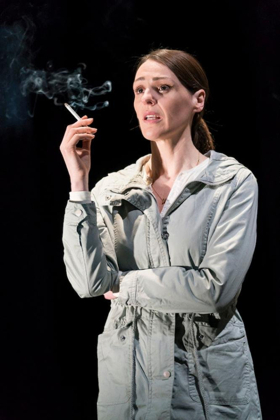Review: FROZEN, Theatre Royal Haymarket
|
![]() No, it's not that Frozen - although the immortal words "Let it go" do appear in the second half. Otherwise this is a far cry from the Disney juggernaut. Bryony Lavery's 1998 play deals with the abduction of a child, and asks whether evil can be easily defined - or forgiven.
No, it's not that Frozen - although the immortal words "Let it go" do appear in the second half. Otherwise this is a far cry from the Disney juggernaut. Bryony Lavery's 1998 play deals with the abduction of a child, and asks whether evil can be easily defined - or forgiven.
 The play is initially composed of monologues by three individuals, whose stories gradually tie together. Suranne Jones plays Nancy, the mother of missing child Rhona; Jason Watkins is loner Ralph, whose confidences grow more sinister; and Nina Sosanya is Agnetha, a criminal psychologist studying serial killers.
The play is initially composed of monologues by three individuals, whose stories gradually tie together. Suranne Jones plays Nancy, the mother of missing child Rhona; Jason Watkins is loner Ralph, whose confidences grow more sinister; and Nina Sosanya is Agnetha, a criminal psychologist studying serial killers.
It's a form perhaps better suited to a smaller studio space, rather than a West End playhouse, and doesn't exactly aid dramatic momentum. Too often something is artificially vocalised - and repeated - that's easily read in the three excellent performances, particularly Jones's distraught parent. We hardly need an ongoing narration of her feelings as she stands in the bedroom of her lost child.
Once the trio begin to interact, the play comes into sharper focus, and our immediate assumptions are challenged in interesting ways. Abusers are themselves often the victims of abuse, explains Agnetha in a lecture, and there is a big difference between 'sin' (evil) and a 'symptom' (illness).
The latter, of course, suggests diminished responsibility and a measure of understanding, even forgiveness - particularly if childhood abuse has long-term effects upon the victim's brain, rendering them unable to make certain connections or moral choices. However, the drama is rather less compelling than the theorising, contorted into too neat a climax - with several odd character beats and plot holes along the way.
Jonathan Munby's production is also too heavy-handed. Perhaps in an attempt to fill out the stage, there's vast video projections from Luke Halls, flickering between the synapses of the brain, icy wastelands and the face of a child - vivid, but overwhelming the actors. As does Christopher Shutt's busy soundscape.
The most egregious choice is a reproving ghost child following Ralph around, making literal something that's far more interesting left ambiguous, and robbing the climax of some of its complexity. Rather than deepening our connection to the characters, such choices widen the gulf.
However, the well-cast actors provide enough to keep us hooked. Watkins is the standout, using his engaging amiability to horrifying effect as Ralph demonstrates how his cheery "Hello!" hooks a victim, and demonstrating the slipperiness of such a man: his contradictory tales, quick-changing moods, sly manipulation, and the meticulousness employed in planning his crimes versus his startling lack of empathy.
Sosanya is strongest playing off Watkins, teasing out revelations with convivial - but occasionally disturbed - professionalism, and demonstrating the conflict between intrigued scientist and compassionate human being. Less convincing is Agnetha's slightly tortured backstory, further confused by the play's timescale.
Jones has the toughest job, as such narratives have been so prevalent in drama of late - from Broadchurch to The Missing. But she ably charts Nancy's journey from the wry parent of an average, squabbling family to this waking nightmare, and from there her journey into activism and a search for if not justice, then closure.
There's a courageous briskness to her performance that speaks volumes; Nancy isn't the sort of person to ask for pity, but does grasp the power of her tale and how it can be used to demand action - Jones exhibiting that steely resolve familiar to viewers of Doctor Foster. Lavery touches on a darker, natural justice, and notes how in America relatives of victims can watch the executions of their killers.
Another interesting but undernourished thread concerns Nancy's surviving daughter, Ingrid - also trying to make sense of this tragedy, and often neglected by her mother, who remains with Rhona, suspended in time. That 'frozen' theme appears in several places - in some cases, too overtly and unconvincingly.
If ultimately less than the sum of its parts, it's still a piece that throws up interesting questions, and is here anchored by a strong cast - with Watkins' performance the one likely to follow you home.
Frozen at Theatre Royal Haymarket until 5 May
Photo credit: Johan Persson
Comments
Videos

